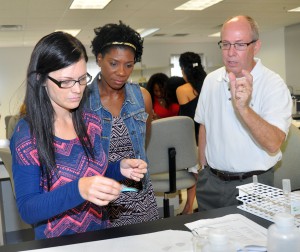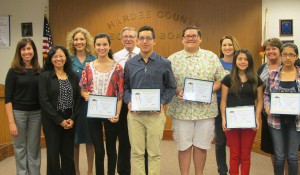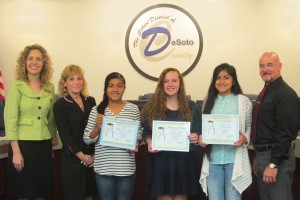AVON PARK, Fla.–May 31, 2016–South Florida State College’s 2016 class of dental hygiene graduates came out on top on their national board examinations, with a 100 percent pass rate.
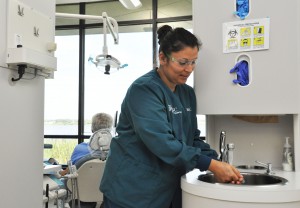
Blanca Cendejas ensuring proper hand hygiene before attending to a patient at SFSC’s dental education clinic.
The soon-to-be dental hygienists completed their coursework in April and received their Associate in Science in Dental Hygiene degrees at SFSC’s May 5 Commencement ceremony.
With their diplomas in hand, the students started taking the national board examination. Then the waiting began, with students checking their mailboxes daily for the examination results.
“We knew going in this was a good, strong class,” said Dr. Deborah P. Milliken, chair of the Dental Education Department. “We just knew they were going to perform well on the boards.”
The examination scores started arriving. Graduate after graduate reported the good news to Dr. Milliken and the dental education faculty.
“At 5 p.m. last Tuesday, I got a call from one of our grads, Blanca Cendejas,” Dr. Milliken said. “She was the last student to report in to us. She was so excited, and so were we.”
Cendejas, a Desoto County resident, joined Nikki Atterberry, Allison Brooke Bivens, Sofia G. Chong, Nancy Jaramillo, Shelby Lynn Lambert, Maria Guadalupe Ruiz, and Janet Velasco in passing their national board examinations.
Milliken said admission to the program is competitive, with students required to take college algebra, microbiology, and anatomy and physiology before they are considered for entry into the program.
Dental hygienists complete a two-year associate degree program. Once they pass the National Dental Hygiene Board, graduates must also pass a practical examination administered by the Florida Board of Dentistry.
Cendejas, who graduated from DeSoto County High School, was on campus the day after getting her test results. “I was ecstatic when the letter arrived,” Cendejas said. “Next, is the state examination and then on to starting my career.”
Milliken said this year’s crop of graduates scored above the national average on all but two subject areas of the board examination. “And in those two areas of the examination, our students scored at the national average,” Milliken said.
Graduates find jobs in dental offices performing direct patient care, taking X-rays, and educating patients about oral hygiene.
Milliken noted last year’s class also had a 100 percent pass rate.
SFSC also offers a 11-month occupational certificate program in dental assisting.
For more information, contact the SFSC Advising and Counseling Center at 863-784-7131 or visit www.southflorida.edu.
AVON PARK, Fla.–May 31, 2016–When Hardee County native Daniel Witt graduated from high school in 1986, he wasn’t sure what he would do. But he knew for whom he would work.
“Growing up my dad was in the U.S. Navy and the family traveled the world with him,” Witt said. “I knew I too would serve and did that by enlisting just two weeks after finishing high school.”
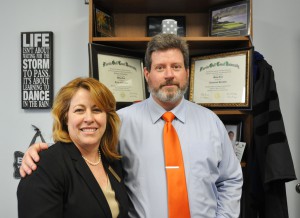
Daniel Witt (right) with Maday Leon, while on a visit to the SFSC Highlands Campus after his graduation.
After 20 years riding frigates and destroyers—sailor speak for serving on a ship—, and showing others how to keep the Navy’s ships secure, Witt earned his retirement. But the relatively tranquil life after military retirement didn’t sit well with Witt.
Now he is set to embark on new career journey. Witt, who graduated in May with the inaugural Bachelor of Science in Elementary Education (BSEE) class at South Florida State College, will teach fourth graders in Hardee County this fall.
As it happens, this won’t be Witt’s first time teaching.
Fresh out of high school, the Navy sent Witt to the Great Lakes Naval Station in Illinois. He trained as a gunner’s mate. “What does a gunner’s mate do on a ship do,” Witt said, with a quizzical expression. “Well, we handle ship-borne weapons systems that blow up other things, like enemy ships, submarines, or land targets.”
Witt became expert at maintaining the Harpoon missile that can skim the ocean surface in search of hostile ships. He worked to keep the ASROC anti-submarine missile system at the ready, giving his ship the ability to fire a missile at submerged submarine as far as 12 miles out from his vessel.
Prepping the Tomahawk cruise missile for firing also came under Witt’s watch. The missile that hugs the earth’s surface while in flight can destroy a target 1,200 nautical miles from the ship with pinpoint precision. For the non-sailor, that’s 1,380 land or statute miles.
In late 1990s, while serving in the Persian Gulf aboard the USS Curtis Wilbur, an Arleigh Burke-class destroyer, Witt and his shipmates nearly had chance to try their hand at getting bin Laden. “We were in the gulf and got orders to go black,” Witt said, referring to shutting down all the ship’s electronic systems—including the radar—in order to avoid detection.
“In the middle of the night, we went to general quarters and starting spinning the Tomahawks to ready them for launch because there was a fix on bin Laden’s location,” Witt said. “But the orders were countermanded at the last minute by President Clinton.”
In 2006, Witt left the Navy with a monthly retirement check and benefits from the Montgomery G.I. Bill that would pay for four years of college coursework. But he had no plans to start taking classes. “I put in 20 years of work and I was ready to do my own traveling and have time for relaxation,” Witt said.
After several years of travels and working as an airport screener for the TSA in Tennessee, Witt moved back to Hardee County to join his family. “I started thinking about those G.I. Bill benefits and knew it was time to start college, so I went to the SFSC Hardee Campus and enrolled with a plan to earn an Associate in Science in information technology,” Witt said.
“Right into my first term I fell in love with college work at SFSC,” Witt said, recalling that he opted out of starting college while in the Navy. “After sitting down with Teresa Crawford [the SFSC Hardee Campus director] to discuss my long range plans, I decided to switch to the Associate in Arts degree program because I would have more options to transfer to a four-year university.”
Witt said he took a course load heavy with math. “I was a techie in the Navy, so I thought engineering was in my future,” Witt said. “But when I got to the electrical side of physics, I thought maybe engineering wasn’t for me.”
Still, Witt graduated with his associate degree in May 2013 and took the summer off to think about his next two years. “I went back to the Hardee Campus folks to talk about my options,” Witt said. “I can’t say enough about those guys. They got me thinking about the bachelor’s degree program in elementary education.”
Not entirely sure if he was a fit for the elementary school classroom, a lifelong bachelor, Witt took preparatory education coursework that required logging in classroom observation hours. “I had a blast in the classroom,” Witt said with marked air of enthusiasm. “I said let’s give this a go!”
SFSC launched the two-year BSEE program with start of the 2014 fall term. Students who have an Associate in Arts (AA) degree, passed a state-mandated test, and completed prerequisite education courses, are eligible to enroll in the program.
In the fall of 2014, Witt joined the alpha cohort, the 18 students who comprised SFSC’s first class of BSEE students. “The first term was a bit rough for all of us, and we lost a few students, but by the second term we all got the rhythm of the pace of studies,” Witt recalled.
Witt got assigned to Bowling Green Elementary School in northern Hardee County to finish out his last internship.
Maday Leon, the lead instructor of the SFSC BSEE program dropped in at Bowling Green for a routine site visit. “What I saw that day made me so proud of our students,” Leon said. “One of the teachers was having difficult time with a young boy and called Witt for help.”
Leon said Witt’s intervention calmed the student. “I said to myself this fellow is going to make a wonderful teacher,” Leon noted.
The principal at Bowling Green had the same thought. She told Witt after he passed the final state-required certification examination, he had a job teaching fourth graders. Witt had a job and had not yet picked up his diploma from SFSC.
“All those math courses I took in my first two years now come in handy,” Witt said with laugh. “I’ll teach math to the fourth grade kids starting in August.”
Witt said he owes a debt to J.J. Moye, SFSC professor of mathematics. “Prof. Moye was an amazing instructor,” Witt said. “He had a knack for taking difficult math problems and getting students to understand them”
“I’m going to use his approach when working with my students,” Witt said.
Witt also showered praise on the BSEE faculty. “The faculty are dedicated to student success,” Witt said. “We had one instructor delay her retirement so that she could see us through to the end.”
Speaking like a gunner’s mate, Witt said, “When you finish this program, you come out fully loaded.” He noted that, unlike similar programs, SFSC students graduate with endorsements in reading and English for Speakers of other Languages (ESOL), both of which are of interest to principals aiming to hire highly qualified teachers.
When Witt steps into the classroom this fall, it won’t be his first time teaching. “My last assignment in the Navy involved using my years of experience to teach sailors how to protect our ships when they were in port,” Witt explained. “I remember that as one of my coolest assignments—teaching young sailors what I had learned.”
Before Witt gets involved in the rigors of the school year, he will enjoy his favorite pastime: reenactment. “I’m a member of the 2nd Florida Volunteer Infantry,” Witt said. “We get together with other groups to reenact Civil War battles, which is an endeavor that really means a lot to me.”
A self-described history buff, Witt has traveled with his fellow volunteers to Gettysburg, Manassa, and Antietam Creek to reenact historic battles, meeting up with as many as 10,000 others from across the nation. “At times one would almost forget the battle was a reenactment,” Witt said. “When you see the glint of the enemy’s rifle across a field, you can’t help but get a feel for what a soldier 150 years ago thought at that very moment.”
Come August, Witt will be meeting up with fourth graders for a real life encounter.
“When I was in the Navy, I went to work every day thinking I was doing something important,” Witt said. “When I retired, I wasn’t making a difference.”
“But when you are teacher, you’re making an impact every day on young lives by influencing their futures,” Witt explained. “I can’t think of many jobs where someone can say he or she has made that kind of a difference.”
AVON PARK, Fla.–May 27, 2016–Kevin Brown, who has overseen South Florida State College’s applied sciences and technology programs for 18 years, will bring his academic career to end with his retirement on May 31.
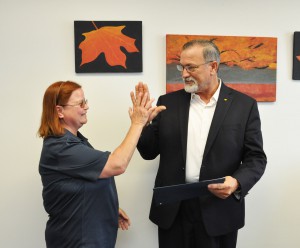
Lena Phelps, membership coordinator for the SFSC chapter of the Florida Association of Colleges congratulating Kevin Brown on his retirement.
“It’s time for me to turn the page and move on,” Brown told a group of well-wishers who turned out for a reception honoring him. “In one sense, I feel as if I won the lottery because retirement guarantees me an income without having to show up for work anymore,” he said, to the laughter of his colleagues.
Brown started with SFSC in fall 1998. His arrival came after a nearly two-decade career with the Hardee County School District. At the close of a 14-year stint teaching agriculture to students at his alma mater, Hardee Senior High School, Brown headed up the district’s vocational programs for five years.
It was Brown’s experience in vocational education that brought him to the attention of SFSC’s then dean Michele Roberts. Brown said in his 19 years with the Hardee County School District, he never applied for a job elsewhere. But Roberts convinced him he could make a greater impression on the future of students at SFSC.
At first, Brown assumed the title of director. Within two years, he was named dean, placing him over educational programs that ranged from practical nursing to electronics to network service technology.
At the time, then president Dr. Catherine P. Cornelius lauded Brown’s stewardship of the program for matching “training programs to business and industry need” and for helping “well-trained graduates move into satisfying jobs.”
In his 18 years at SFSC, Brown has overseen a major expansion of the college’s educational offerings.
Brown said physicians and doctors in SFSC’s service district of Hardee, DeSoto, and Highlands counties had expressed a need for a local source of radiographers.
“We heard that need and worked some magic finding space and funding,” Brown said. “In the end, we played with the blueprints, found the money, and SFSC now has an accredited radiography program.”
During Brown’s tenure, he guided SFSC’s launch of its first four-year degree program, the Bachelor of Applied Science in Supervision and Management (BAS-SM). For the first time in its nearly half century of operation, SFSC’s students did not have to move to Tampa, Orlando, or Gainesville for a full undergraduate education.
In 2014, Brown was also instrumental in shepherding through to fruition another four-year program, the Bachelor of Science Degree in Nursing (BSN). While SFSC already had an Associate Degree in Nursing (ADN) program that graduated RNs, the health care system has increasingly demanded nurses with higher educational achievements.
“Without a doubt, Dean Brown has left his mark on SFSC’s applied sciences and technologies programs,” said Dr. Sidney Valentine, the college’s vice president for academic affairs and student services. “Dean Brown was instrumental in launching programs such as radiography, as well as bachelor’s degrees in supervision and management as well as nursing. SFSC students are finding rewarding careers because Dean Brown helped launched programs for in-demand jobs.”
As Brown was preparing for his retirement, he didn’t ease off on his drive to expand educational programs at SFSC. Working with members of the Florida Legislature and local stakeholders, Brown took the lead in bringing a fire science program to SFSC in 2015.
Florida’s Heartland now has its own facility at the SFSC Highlands Campus where residents can attain the training required to serve as a certified firefighter.
“It is hard to say goodbye to someone who has done so much for so many,” said Rebecca Sroda, dean of SFSCs health sciences programs.
“He has found funding for faculty to obtain advanced degrees, wrote grants for special projects, and provided strong support in obtaining national accreditation for our programs. Kevin has been our students’ and employees’ biggest champion and always had their back,” Sroda said.
The SFSC chapter of the Florida Association of College presented Brown with a certificate of appreciation for his service to the students at SFSC and for 17 years of service to the association.
Brown said someone had recently asked him what contributed to his success as dean. “I told him it was the people,” Brown said. “It’s the people you work with who you go to bat for to help them succeed. It’s the people you work with that you have an expectation of that they’ll succeed.”
Brown has mapped out a busy routine as makes way for his successor, SFSC professor Erik Christensen, to succeed him.
“I’ve got 450-acre ranch in Hardee with 80 head of cattle that need looking after,” Brown said. “My plan is to grow that to 150 head.”
Brown never forgot his roots as a young man teaching agriculture to Hardee High School students. He has been active in Florida Future Farmers of America (FFA), helping sponsor a chapter at SFSC. The state organization gave Brown its Honorary State FFA degree, an award that recognizes members for their lifelong commitment to agricultural education.
After 37 years helping the region’s students get the education they need to succeed, Brown’s retirement from SFSC won’t mean an end to his teaching. Brown is researching how he can open the ranch up to young people so that can learn about agriculture.
“I’m hoping to start a program that will promote agriculture to young folks,” Brown said, pausing for just moment. “Yeah, that’s what I want do now.”
AVON PARK, Fla.–May 25, 2016–South Florida State College’s Corporate and Community Education Department is offering two preparatory courses—in math and English–for the General Knowledge Test (GTK) portion of the Florida Teacher Certification Examination (FTCE).
The GKT is one of three tests that compose the FTCE. Florida law requires that teachers demonstrate mastery of basic skills, professional knowledge, and a content area of specialization. Testing requirements for teacher candidates seeking certification are described in 6A-4.0021 Florida Administrative Code (FAC).
SFSC offers a Bachelor of Science in Elementary Education degree (BSEE) that prepares students to work with children in kindergarten through grade six. Graduates are eligible for Florida certification in K-6 with ESOL and Reading endorsements. One of the prerequisites for entering the program is a mastery of general knowledge, including the ability to read, write, and compute, by passing the GKT of the FTCE.
The two GKT preparatory courses offered through SFSC are:
FTCE: General Knowledge, Math (CRN30899), 6 hour course. Students review the mathematics skills and problem solving techniques for the GKT portion of the Florida Teacher Certification Exam and learn techniques to maximize test results. The cost of the course is $65. The course is held on Monday, June 6, and Wednesday, June 8, 4-7 p.m., in Room 204, SFSC University Center, Highlands Campus, Avon Park. The required textbook is: CliffsNotes® FTCE General Knowledge Test Prep 3rd Edition, ISBN-13: 978-0544309883.
FTCE: General Knowledge, English (CRN 30900), 6 hour course. Students will review the grammar rules that will help them pass the English Language Skills portion of the GKT. The cost of the course is $65. The course is held Monday, June 13, and Wednesday June 15, 4-7 p.m., in Room 204, SFSC University Center, Highlands Campus, Avon Park. The required textbook is: CliffsNotes® FTCE General Knowledge Test Prep 3rd Edition, ISBN-13: 978-0544309883.
Register for these classes in Building B, at the Highlands Campus or any SFSC campus or center. Registration fees can also be paid over the phone by calling 863-784-7405.
For more information about the GTK preparatory courses or SFSC’s BSEE program, contact Michele DeVane at 863-784-7174 or Dr. Maday Leon at 863-784-7154.
AVON PARK, Fla.–May 25, 2016–Dr. James Hawker, a biology professor at South Florida State College, may spend less time in the classroom for the next few years.
Since 2011, Hawker has carried a full load of courses, teaching SFSC students the fundamentals of microbiology and anatomy and physiology, or “A&P” in the lingo of undergraduates.
Why the change? On July 1, Erik Christensen will step down as chair of the college’s Natural Sciences Department, making way for Dr. Hawker to replace him. Christensen will take over as dean for SFSC’s applied science and technologies programs after the departure of Kevin Brown, who held that post for 18 years.
Now, as SFSC prepares for the start of a new academic year in August, Dr. Hawker will likely lighten his teaching load to free up time to manage the department.
“I am told it’s a challenge becoming department chair,” he said from his office in SFSC’s Norman L. Stephens Jr. Health and Science Education Center. “I’ll run the day-to-day operations of the department, which is very much unlike classroom teaching.”
But Dr. Hawker sees his role as much more than administrator.
“I look forward to using the office as a venue to promote undergraduate research in the classroom,” he said.
Increasingly, colleges with two-year programs are working scholarly research—once the domain of large universities— into the curriculum. “Research is also learning,” said George Boggs, president of American Association of Community Colleges. “It may be one of the most effective ways to engage students in learning a discipline.”
When Dr. Hawker came to SFSC, he brought with him a wealth of experience not just in teaching, but research at major academic health sciences centers. The experience gleaned from years of growing cells in a laboratory will benefit SFSC students as part of a drive to enhance classroom learning.
Dr. Hawker, a native of Biloxi, Miss., attended high school in Texas, where his father, an Air Force officer, was stationed. In 1977, he enrolled in the University of Texas at Austin. Dr. Hawker says he “bleeds Longhorn,” betraying his love for the Lone Star State and its powerhouse football team.
“When I got to college, I really took to biology and chemistry,” he said. “Many of my peers had medical school on their minds, but even though I tested as having an affinity for going in that direction, I went toward research.”
After earning his undergraduate degree, Dr. Hawker’s interest in biological research led him to the University of Houston, where earned his master’s degree while doing research in astrobiology, the study of life in space and earth.
“I found it a fascinating subject, but I learned there were scant career prospects in that field because NASA had cut back on funding research in astrobiology,” he said.
In 1989, eager to continue biological research, Dr. Hawker, with his wife and young daughter, moved 100 miles from Houston’s enormous metropolitan region to the relatively small town of College Station to work toward a doctoral degree at Texas A&M University.
“After my stint researching astrobiology, I found an interest in human health, particularly cell biology,” he said of his arrival at Texas A&M’s health sciences center. “I did my dissertation on angiogenesis, or growing new blood vessels in plain speak.”
While doing research at Texas A&M, Dr. Hawker also had an opportunity to get behind the lectern, teaching cell biology to medical students.
Dr. Hawker’s career path came to abrupt turn in the road at College Station—his wife died of cancer.
Late in 2002, he decided to move with his 13-year-old daughter to Tampa to take up a research position at the Moffitt Cancer Center.
“With the death of my wife from cancer, doing research at an academic cancer center meant something to me,” he said. “I had to move on and do something different.”
Most research positions come about through grant funding, and Dr. Hawkers’ Moffitt job came to an end in 2005. So, looking for work, he accepted a full-time teaching position at nearby Hillsborough Community College.
“Several friends in the profession told me I had knack for teaching,” he said. He put aside the lab coat and took on a regular teaching load, introducing students to microbiology and A&P.
Like many academic scientists, Dr. Hawker had been immersed in research, with classroom teaching often grafted on to one’s laboratory work. “I found at Hillsborough that what some friends saw as a knack became for me a passion,” he said.
While in Tampa, he met his second wife, who moved to Tallahassee to start a new job. Dr. Hawker followed and taught introductory biology to students at Florida State University and Tallahassee Community College.
“I was working as an adjunct instructor but I really wanted full-time employment,” he said of this time in Tallahassee. “After a statewide job search, SFSC offered me a position and I took it.”
Dr. Hawker taught his first class at SFSC in fall 2011. He already had six years of teaching students in associate degree programs the basics of biology. He noted the move to the region unfolded smoothly, with Hawker and his wife, Pat, readily appreciating the draw the community has for many newcomers.
He and his wife, who is an adjunct psychology instructor at SFSC, bought a home in Frostproof with a large yard, one that would accommodate Charlie, their Great Pyrenees.
“My wife and I went to an animal shelter and saw this beautiful dog in a cage with a sign that read ‘Help me! I don’t know why I’m here’,” Dr. Hawker said with a trace of endearment. “I told my wife we had to take him home, and we did.”
A guard dog by breeding, Dr. Hawker said the 125-pound Charlie barks at the hint of any intrusion—human or not—into his family’s space. “But, as it happens, he’s the gentlest of creatures,” he said.
Dr. Hawker also found a passion for running when he moved to the area. “I’ve become an avid runner,” he said. “I guess I just got sucked into it unknowingly.” He came in first place among his age group at this year’s Panther 5K run.
As he delighted in his knack for making cell biology and the skeletal system accessible to undergraduates at the SFSC Highlands Campus, his love of research started tugging at him. In 2014, Dr. Hawker teamed up with Christensen, his predecessor as chair and a professor of physics, to offer a research-oriented astrobiology course to students in the college’s Honors Program.
“Students were assigned projects that required them to conduct scholarly, scientific research dealing with life in space,” Dr. Hawker said, recalling his first foray into research as a student in Houston. The students’ research covered the effects of space travel on humans, the contribution of comets to life on earth, and terraforming the planet Mars.
“An amazing moment came at the end of the semester when the students stood at their desks and applauded Christensen and me,” he said. “That was a tremendously heartening experience.”
Now that he has taken the reins of the Natural Sciences Department, he is looking for opportunities to expand undergraduate research, and not just in science.
“I believe undergraduate research in any subject or field is a way to increase student involvement with their subject, learn it at a deeper level, and promote their analysis and critical thinking skills,” he said.
Dr. Hawker said these are all attributes that can benefit any student, whether transferring to a four-year institution or completing a terminal degree at SFSC.
Nancy Hensel, who heads up the Council on Undergraduate Research, observed that industry looks to associate degree-granting colleges to develop an “educated and technologically up-to-date workforce.” She sees undergraduate research playing an important role in meeting industry demands.
A sentiment echoed by Dr. Hawker as he prepares to assume his new role at SFSC.
“Employers value students who can analyze and problem solve,” he said. “Undergraduate research promotes just that.”
AVON PARK, Fla.–May 24, 2016–At any point throughout the year, hundreds of adults whose native tongue is not English are enrolled in South Florida State College literacy classes learning basic communication skills.
From how to read signs on buildings to signing one’s name in the correct space on a form, the daytime and evening English for Speakers of other Languages (ESOL) classes at SFSC offer non-native speakers an opportunity to fit into American society by learning English.
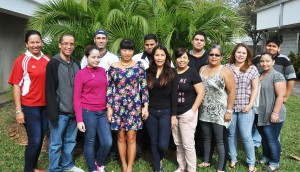
A group of SFSC ESOL students who studied the “Staying Healthy” curriculum get together after one of the daytime classes.
Now, with help from a grant, SFSC has broadened its literacy curriculum to teach ESOL students the basics of navigating the complexities of the health care system.
“Not only do the non-English speakers who come to SFSC ESOL classes need help with the basics of reading and writing,” said Carol Pinzon, who coordinates the ESOL program at SFSC. “They often stumble when it comes to visiting a doctor or reading the labels on their medicines.”
Pinzon seized an opportunity last year from the Florida Literacy Coalition to apply for a $4,500 grant to help SFSC add health literacy to its standard ESOL curriculum.
In working with the coalition on writing the grant, Pinzon learned that 50 percent of non-native English speaking adults also lack basic health literacy. “One fact stood out for me,” Pinzon said. “These people are also more likely to suffer from chronic medical conditions and be unaware of how to manage their illness.”
Even though the grant amount was relatively modest, Pinzon said the most important feature of the project was the no-cost teaching materials and technical assistance SFSC received from the Orlando-based coalition that spearheads literacy initiatives across Florida.
SFSC received access to the “Staying Healthy” curriculum, an award-winning set of instructional materials used in ESOL programs in other states. It is written at a 5th grade reading level and is intended for newcomers to ESOL classes.
Pinzon said SFSC also benefited from training and access to technical support from the coalition. “Projects coordinators from across the state gathered in Orlando for training on how to implement the curriculum and what best practices led to success in students improving their health literacy,” Pinzon said.
After getting up to speed on the “Staying Healthy” curriculum, Pinzon selected five ESOL classes to pilot the project. SFSC instructors didn’t need to alter their instructional methods to bring the curriculum into the classroom, according to Pinzon. She said the printed materials and topics were a “natural fit” for what they were already doing with their students.
Students learned the essential elements of health care in the community. What makes an emergency room different from a doctor’s office. The names of body parts a doctor might point to during an examination. How to ask questions of a pharmacist about a label on a bottle of pills.
Pinzon said another component of the curriculum was a hit with the adult learners: project-based instruction. “The students worked together to craft healthy recipes as part of the nutritional element of the curriculum,” Pinzon said. “The students really enjoyed collaborating with each other and, in the end, came up with recipes for many traditional dishes with a healthier angle.”
The students posted their recipes to a website so that future ESOL classes can follow their example.
Pinzon added to the standard curriculum. She brought in instructors to teach CPR, organized a trip to a Publix supermarket to test students’ label reading skills, and had local nurses present diabetes prevention workshops to the classes.
“On the whole, the health literacy instruction helped our students become more proficient in English at a rate that was higher than with the use of more traditional curriculum,” Pinzon said. She pointed out that Florida Blue, the state largest insurer, provided major funding to the literacy coalition’s statewide efforts.
A few students also reported securing health insurance after learning how to access the online marketplace, according to Pinzon.
Pinzon said there were benefits for the college’s ESOL program as whole, in addition to what the students learned. “By bringing in health experts and working with local businesses, we created partnerships that will help the ESOL program in the future.”
“One goal was to improve out students’ health literacy so that they could make informed choices about their health and nutrition,” Pinzon said. “In doing that, we also improved their basic English skills, which was an equally important goal.”
SFSC offers ESOL classes in Hardee and Highlands counties. ESOL classes in DeSoto County are available at the school district. Students can enroll in daytime or evening classes. Some classes are held off-campus at churches and community centers. For more information, contact Pinzon at 863-784-7380 or pinzons@southflorida.edu.
AVON PARK, Fla.–May 17, 2016–SFSC’s Take Stock in Children (TSIC) program recently awarded nine new scholarships to middle school and high school students in Hardee and DeSoto Counties at contract signings in April.
TSIC students are matched with mentors who meet with them regularly and help them prepare for college. The South Florida State College Foundation is the lead agency for TSIC in DeSoto, Hardee, and Highlands counties. Since 2000, more than 400 students have graduated from the local TSIC program. Currently, 155 students, grades 7 through 12, are active in the program.
The SFSC Foundation serves as the lead agency for TSIC within the college’s service district of DeSoto, Hardee, and Highlands counties.
For information about Take Stock in Children, call Irene Castanon, program coordinator, at 863-453-3133 or visit TSIC SFSC.
Hardee County Front row, from left: Hardee Sr. High School Principal Dr. Michele Polk, TSIC Program Coordinator Irene Castanon, TSIC scholars: Yisselle Mier, Jose Aleman, Richard Torres, Brittany Lopez-Perez, Esmeralda Morales. Back row, from left: SFSC Foundation Executive Director Jamie Bateman, Superintendent David Durastanti, Hardee Jr. High School Asst. Principal Meredith Durastanti, and School Board Chairperson Teresa Crawford.
DeSoto County From left: SFSC Foundation Executive Director Jamie Bateman, DeSoto Middle School Principal Denise Schultz, TSIC scholars: Yeni Flores-Velasquez, Destiny Pelham, Avigail Avila, and Bobby Turnipseed, representing DeSoto County School Board. Student not pictured: Deacon DeFilippo.
AVON PARK, Fla.–May 17, 2016–Cindy Eaton, a native of Montana, is now a Florida-based artist and professional wildlife and nature photographer. ‘Hammock to the Beach’ is an art expo depicting Hammock and local tropical wetlands, as well as beach habitat and scenery.
Eaton’s award-winning art reflects her passion for this ecosystem in nature and the world that surrounds her and has been exhibited in many galleries and art expos throughout Florida. Quoting one of Cindy’s friends, she ‘shoots with her heart’ to capture and help preserve this fragile ecosystem of nature as lifelike as possible, bringing the most intricate of details up close and personal. Her desire to present each photograph as lifelike as possible for your pleasure and enjoyment motivates and inspires her to expand her own artistic passions.
‘My love for nature, especially living here in Florida with the abundance of birds, wildlife and water habitats has had a great impact on how I endeavor to shoot and capture unique photographs. Highlands Hammock State Park has become a favorite hangout to shoot photos … along with Florida beaches, on both the Gulf of Mexico and the Atlantic.’
Eaton’s ‘River of Grass’ expo featuring 33 prints on aluminum was exhibited at the Ernest F. Coe Visitor Center in Everglades National Park 1 – 31 January, 2015. 1 – 30. Cindy’s current exhibit, ‘Hammock to the Beach,’ featuring 19 prints on aluminum was also on expo at Highlands Art League Yellow House Gallery in Sebring, Florida last September.
The exhibition will be available for viewing Monday, Wednesday, and Thursdays, 11:30 a.m. – 2:30 p.m., at the Wildstein Center until June 29.
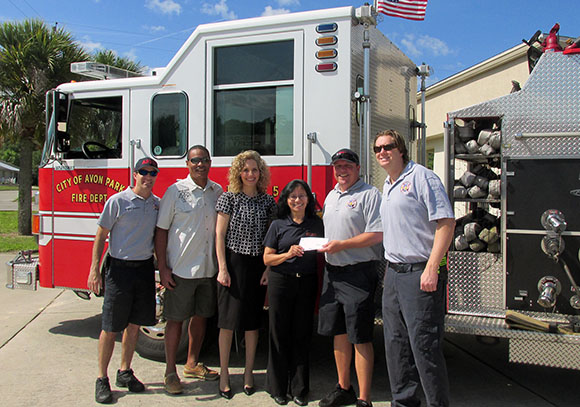
Photo: (pictured from left): Firefighters Clint Culverhouse and Warren West, SFSC Executive Director of Institutional Advancement Jamie Bateman, TSIC Program Coordinator Irene Castanon, and firefighters Anthony Gaines and Mike Turek
AVON PARK, Fla.–May 12, 2016–More children will receive college scholarships because of local firefighters. The Florida Professional Firefighters Local Union 3132, recently, presented a check for $1,000 to the local Take Stock in Children (TSIC) program.
“Education is a key to a child’s success and we, the Florida Professional Firefighters Local Union 3132 in Avon Park, wanted to invest or ‘take stock’ in a child’s future by donating a check in the amount of $1,000 to South Florida State College’s Take Stock in Children program,” said Anthony Gaines, firefighter.
TSIC is a statewide program that provides college scholarships to at-risk students who agree to remain drug-free, stay out of trouble with the law, and maintain satisfactory grades throughout high school. Students are matched with mentors who meet with them regularly and help them prepare for college. The South Florida State College Foundation is the lead agency for TSIC in DeSoto, Hardee, and Highlands counties. Since 2000, over 400 students have graduated from the local TSIC program. Currently, 155 students, grades 7 through 12, are active in the program.
“We are grateful for the Florida Professional Firefighters Local Union 3132 for its professional service to the community and for its generous donation toward a child’s college education,” said Irene Castanon, TSIC program coordinator.
For more information about making a donation to TSIC scholarships or becoming a student mentor, visit the SFSC website and look under “Giving,” or call Castanon at 784-7343.
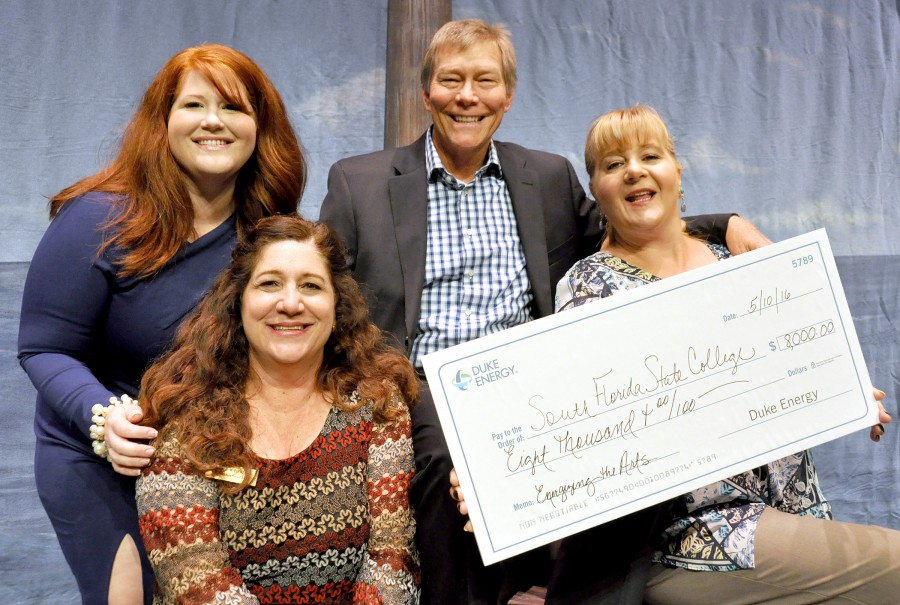
On behalf of the Duke Energy Foundation, Jerry Miller (center) presents an $8,000 check to South Florida State College, which funds the 2015-16 season of Young People’s Theatre. Pictured with him are (left) Dr. Lindsay Lynch, SFSC’s director of grants development, Mitzi Farmer, cultural programs specialist, and Cindy Garren, director, cultural programs.
AVON PARK, Fla.–May 10, 2016–For the second year in a row, an “Energizing the Arts” grant from the Duke Energy Foundation has funded an entire season of South Florida State College’s Young People’s Theatre.
On Tuesday, Cindy Garren, director, SFSC Cultural Programs, accepted an $8,000 check from Jerry Miller, the government and community relations manager for South Central Region External Relations of Duke Energy Florida. The donation pays the entire cost of bringing three Young People’s Theatre Shows for Highlands County’s school-aged children to the Alan Jay Wildstein Center for the Performing Arts . The 2015-16 performances were the “The Lightning Thief,” “Henry and Mudge,” and “20,000 Leagues Under the Sea.”
“Arts and culture are one of the areas we support through the Duke Energy Foundation,” Miller said. “We fund programs that allow children to have experiences they might not otherwise have. Although we heavily support sciences, technology, engineering and math programs, we believe an introduction to art and culture is important to the development of a well-rounded student. We recognize that great communities have great culture.”
“The Duke Energy Foundation partners with South Florida State College in bringing professional live theater to schoolchildren,” Garren said. “Young People’s Theater performances are often the first time our local students have the opportunity to see a live performance geared toward children. With its donation, the Duke Energy Foundation brings smiles and joy to the students while launching their appreciation for the performing arts.”
SFSC provides cultural experiences to the community through its Artist, Jazz, Matinee, and Florida Hospital Trending Now series, Young People’s Theatre, the SFSC Museum of Florida Art and Culture (MOFAC), and special performances throughout the year. For more information, visit Performing Arts or call the SFSC Box Office at 784-7178.

